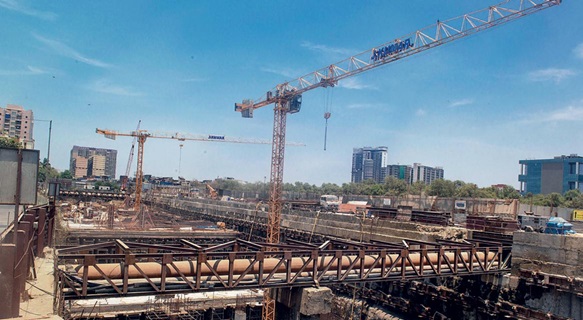The MahaYuti government has decided to design policies to attract private sector participation in sustainable urban infrastructure development, management and service delivery through Digital Platforms.
The state government will promote a circular economy in the city’s water and solid waste management with the help of the private sector. It will mobilise the community for their active participation in Urban Local Governance. Maharashtra is one of the states which has attained over 40 per cent urbanisation with nearly 5.08 crore persons living in urban areas.
According to the Chief Minister’s Office, the state government will allocate at least 10 per cent of the annual budget for the development of infrastructure in Urban Local Bodies and it will provide adequate resources in addition to the budget allocated to the state under Centrally sponsored schemes.
The state government will soon undertake a project to study the risk hazard analysis and prepare an assessment plan pertaining to Fire and other disaster management using 3-D mapping of major Municipal Corporations, especially in Mumbai and Pune Metropolitan Region. There are 27 Municipal Corporations in the state.
“Maharashtra got approval for projects worth Rs 41,927 crore under AMRIT 2.0, and under Swachh Bharat Mission 2.0 the projects of around Rs 22,563 crore are grounded. These projects will benefit more than 82 lakh households in the urban areas. The state government aims to create a livable, climate-resilient smart urban ecosystem and infrastructure by 2047 where each household will have access to 24 x 7 clean & pure drinking water and sewerage system enabled with smart solutions.
All cities will be garbage-free with zero dump sites having 100 per cent scientific disposal of solid waste,” said the CMO. The government aims to develop every city with modern urban amenities, eco-friendly public transportation & mobility solutions powered by renewable energy and energy-efficient technologies.
Due to the increasing pace of urbanisation, the e-government has also embarked upon an ambitious plan to revolutionise the housing sector, especially in economically weaker section (EWS) and lower income group (LIG) housing under the Prime Minister’s Awas Yojana. The state government is in the process of constructing 4,07,143 houses under this scheme.
Further, to bring in transparency and speed in the implementation of development plans, the government has launched the use of digital technology and started the process to transform all Development Plans (DP) completely GIS-based. “All new DP plans are necessarily GIS-based, starting with geo-referenced drone surveys leading to GIS-based existing land use plans and ending with all planned land use depicted on the same GIS base.
All these DP plans are being integrated into the Gati-Shakti platform to ensure that all projects undertaken by the Centre and state government have information about land use plans from the very beginning,” said the CMO.
In the case of land reforms, the state government has digitized all rural and urban land records of rights and integrated them with document registration for effecting auto-triggered online mutations. Over 2.62 crore rural and 70 lakh urban land records of rights are made available to citizens online, connected with e-courts and integrated with cadastral maps.
The state government has envisaged creating common jurisdiction for registration in the entire state — One State One Registration and Faceless Registration through verification of Aadhaar Card and PAN card.

